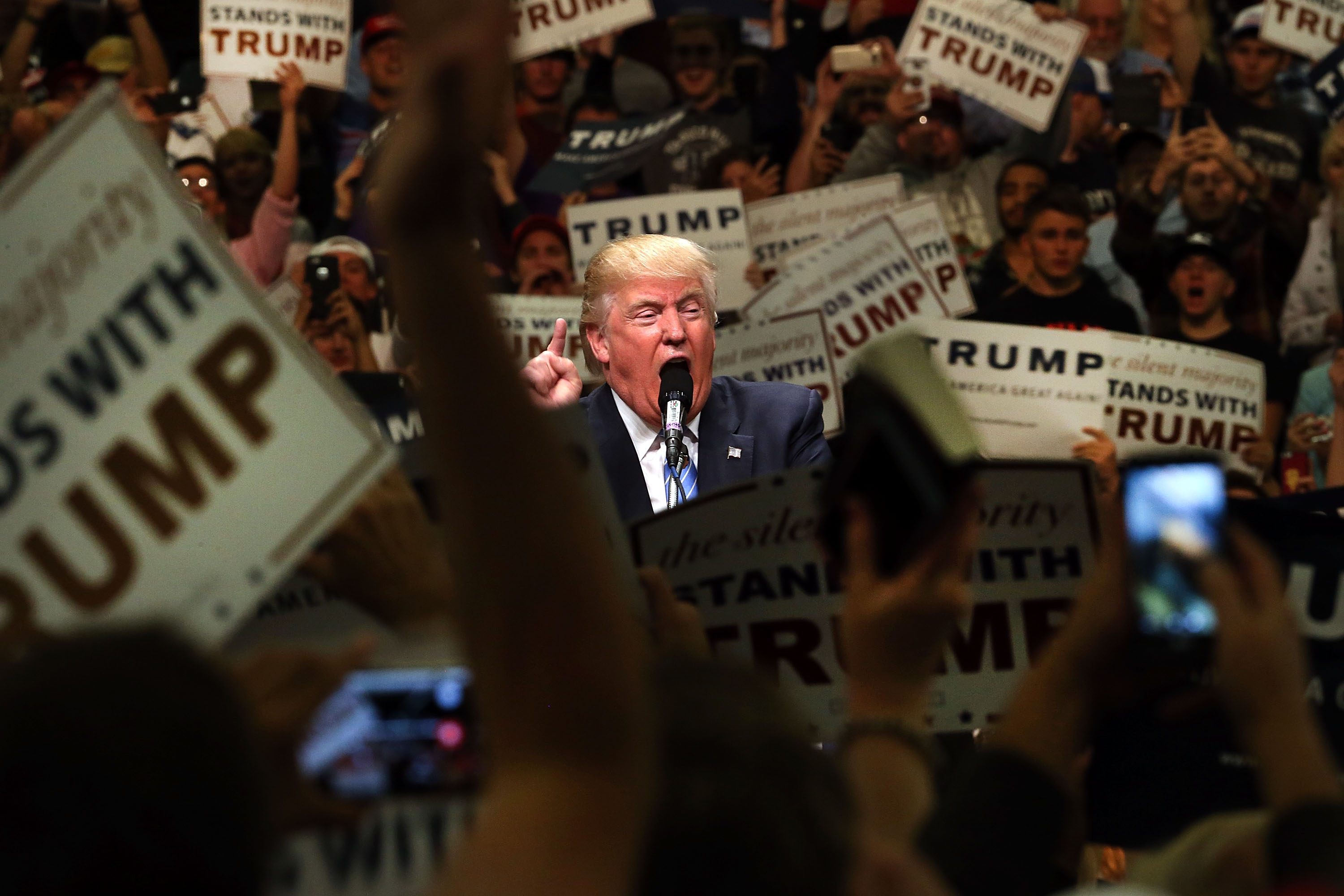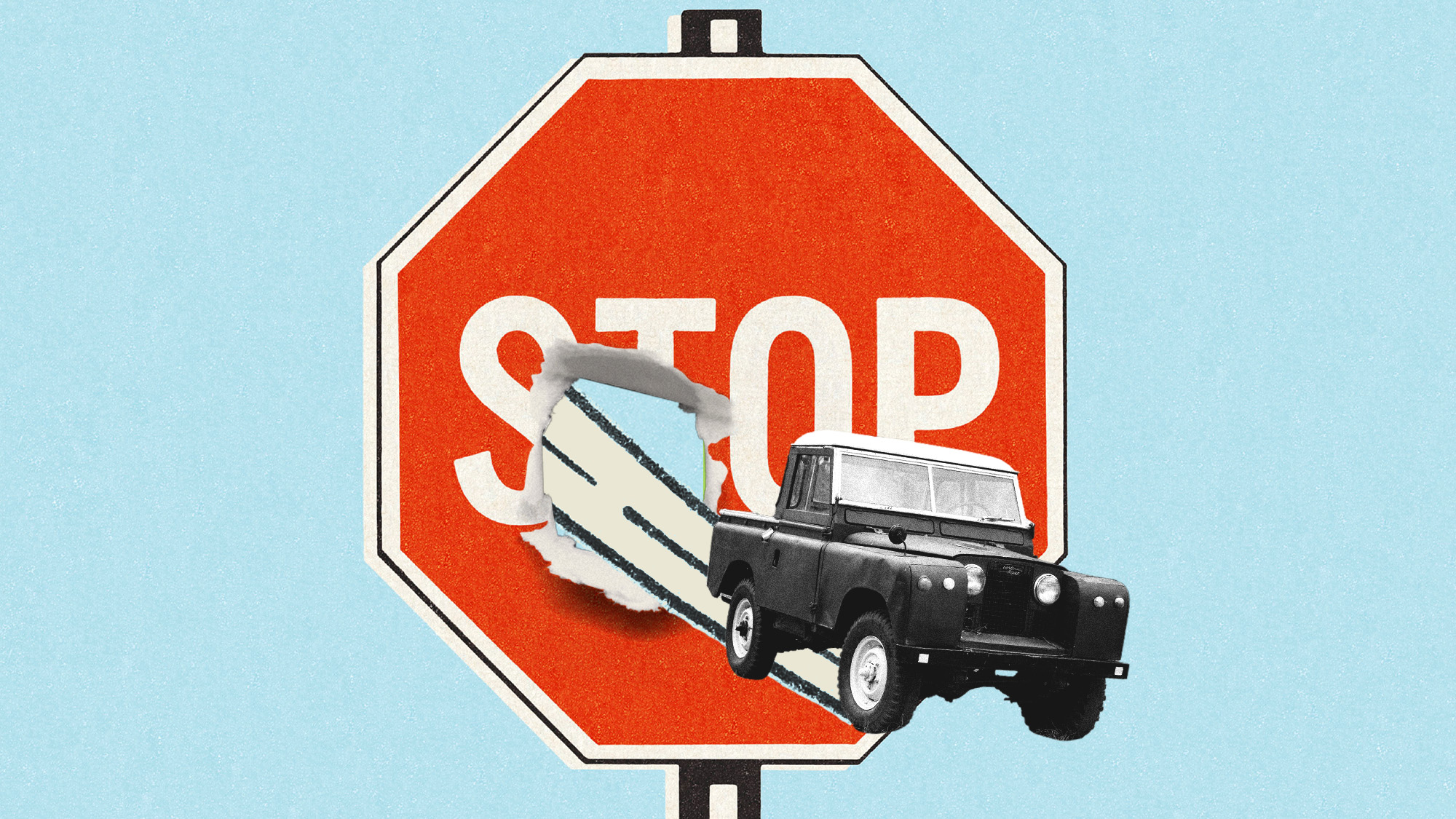Why Trump will break his most crowd-pleasing promises
Mexico won't be paying for Trump's 'Great Wall.' Surprised?


When Donald Trump rallied his supporters on the campaign trail in 2016, no promise would get a more gleeful response than his pledge to build a wall along the southern border. "And who's gonna pay for it?" he'd ask, then bask in the shouted response from the crowd: "Mexico!"
Sensible people responded by pointing out that this was utterly preposterous, a layer of insanity slapped on top of an idea that was idiotic to begin with. Why on Earth would Mexico pay for it? We didn't need Mexican leaders to say that they'd never do it in a million years, even though they made that clear. And every time one of them said so, Trump would say to his flock, "The wall just got 10 feet higher!" More cheers.
But on Friday, we learned that congressional Republicans are moving ahead with all due haste to start building — in other words, American taxpayers will be paying for it.
The Week
Escape your echo chamber. Get the facts behind the news, plus analysis from multiple perspectives.

Sign up for The Week's Free Newsletters
From our morning news briefing to a weekly Good News Newsletter, get the best of The Week delivered directly to your inbox.
From our morning news briefing to a weekly Good News Newsletter, get the best of The Week delivered directly to your inbox.
When reporters pointed that out, Trump naturally became livid that news coverage was something other than a faithful retelling of his particular spin. "The dishonest media does not report that any money spent on building the Great Wall (for sake of speed), will be paid back by Mexico later!" he tweeted in the early morning hours. This will happen "later" in the same sense that Trump kept his promise to tell us on "Tuesday or Wednesday" what he knows about Russian hacking that intelligence agencies don't or that he will release his tax returns after his IRS audit is complete. Which is to say that "later" means "never."
When Trump talked about this during the campaign, liberals like me would say in exasperation, "Don't you all realize this is fake? He's a con man!" His most ardent fans would have responded just like pro wrestling fans do: Of course we know it's fake. The point is the show, the drama, the way it makes us feel.
This was what many of them told reporters during the campaign. As Jenna Johnson of The Washington Post wrote in June, "many of Trump's fans don't actually think he will build a wall — and they don't care if he doesn't. Many also don't think that Trump as president will really ban foreign Muslims from entering the country, seize oil controlled by terrorists, or deport 11 million illegal immigrants. They view Trump's pledges more as malleable symbols than concrete promises, reflecting a willingness to shake things up and to be bold."
But on this particular pledge, it was about more than being bold. Consider the line about the wall getting 10 feet higher when the Mexicans say no. It was about dominance — something deeply important to Trump personally, and which his fans could experience through him. It's about making those foreigners kneel before us, where their resistance only increases our power. It was the equivalent of Michael Corleone telling Senator Geary, "My offer is this — nothing. Not even the fee for the gaming license, which I would appreciate if you would put up personally." That's how you show someone who's boss, by making them pay for their own humiliation.
A free daily email with the biggest news stories of the day – and the best features from TheWeek.com
That was what thrilled Trump's audiences: the idea that through Trump they could feel dominant, potent, admired, and feared. People who complained that the world had conspired to make them impotent and leave them behind saw in Trump a force of empowerment. Mexico paying for the wall isn't about money, it's about power.
But if it becomes just one more broken promise? Political scientists will tell you that contrary to popular belief, presidents keep, or at least try to keep, almost all the promises they make on the campaign trail. But for Trump, those promises didn't function the same way they did for other candidates, as a way of laying out a program voters would (hopefully) find appealing. Instead, his key promises were about creating particular emotions. So at this point it doesn't really matter, not to his most fervent supporters, whether Hillary Clinton is locked up or all the immigrants get tossed out or all the Muslims are barred from coming here or Mexico pays for the wall. The promise doesn't have to be kept because the promise was its own reward.
That doesn't mean Trump doesn't have promises he'll keep. He made plenty of boring ideological commitments to assure Republican partisans they could trust him, on things like cutting taxes for the wealthy, appointing judges who'd overturn Roe v. Wade, taking health insurance away from poor people, or slashing environmental regulations. With the help of the Republican Congress, all that will likely come to pass. It's the more emotionally freighted promises, the ones that really got the crowd's blood pumping, that will be cast aside.
But before you grow too despondent, keep in mind that while Trump's most loyal supporters will never leave him, that doesn't mean broken promises won't hurt. He's already starting with the lowest approval ratings for an incoming president we've ever seen. Many voters saw through his act but decided to give him a shot, and won't be happy if he doesn't deliver.
And we know that on this pledge — as on so many others — he won't.
Paul Waldman is a senior writer with The American Prospect magazine and a blogger for The Washington Post. His writing has appeared in dozens of newspapers, magazines, and web sites, and he is the author or co-author of four books on media and politics.
-
 Zimbabwe’s driving crisis
Zimbabwe’s driving crisisUnder the Radar Southern African nation is experiencing a ‘public health disaster’ with one of the highest road fatality rates in the world
-
 The Mint’s 250th anniversary coins face a whitewashing controversy
The Mint’s 250th anniversary coins face a whitewashing controversyThe Explainer The designs omitted several notable moments for civil rights and women’s rights
-
 ‘If regulators nix the rail merger, supply chain inefficiency will persist’
‘If regulators nix the rail merger, supply chain inefficiency will persist’Instant Opinion Opinion, comment and editorials of the day
-
 Bari Weiss’ ‘60 Minutes’ scandal is about more than one report
Bari Weiss’ ‘60 Minutes’ scandal is about more than one reportIN THE SPOTLIGHT By blocking an approved segment on a controversial prison holding US deportees in El Salvador, the editor-in-chief of CBS News has become the main story
-
 Has Zohran Mamdani shown the Democrats how to win again?
Has Zohran Mamdani shown the Democrats how to win again?Today’s Big Question New York City mayoral election touted as victory for left-wing populists but moderate centrist wins elsewhere present more complex path for Democratic Party
-
 Millions turn out for anti-Trump ‘No Kings’ rallies
Millions turn out for anti-Trump ‘No Kings’ ralliesSpeed Read An estimated 7 million people participated, 2 million more than at the first ‘No Kings’ protest in June
-
 Ghislaine Maxwell: angling for a Trump pardon
Ghislaine Maxwell: angling for a Trump pardonTalking Point Convicted sex trafficker's testimony could shed new light on president's links to Jeffrey Epstein
-
 The last words and final moments of 40 presidents
The last words and final moments of 40 presidentsThe Explainer Some are eloquent quotes worthy of the holders of the highest office in the nation, and others... aren't
-
 The JFK files: the truth at last?
The JFK files: the truth at last?In The Spotlight More than 64,000 previously classified documents relating the 1963 assassination of John F. Kennedy have been released by the Trump administration
-
 'Seriously, not literally': how should the world take Donald Trump?
'Seriously, not literally': how should the world take Donald Trump?Today's big question White House rhetoric and reality look likely to become increasingly blurred
-
 Will Trump's 'madman' strategy pay off?
Will Trump's 'madman' strategy pay off?Today's Big Question Incoming US president likes to seem unpredictable but, this time round, world leaders could be wise to his playbook
